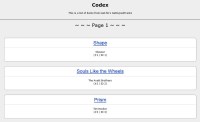Google tries to save the web from the curse of 'infinite scrolling'

"Infinite scrolling" is fashionable, but it is still one of the abominations of today's web. Indeed, it subverts the web's original intention, and destroys its basic design promise.
The whole idea of a URL is that a link points to a resource and that clicking the link gets you the information you need. With "infinite scrolling", it usually doesn't. It takes you to a web page where that information once resided -- during the search robot's brief visit. Maybe you can find it if you keep scrolling down for a few dozen pages, depending on the age of the link, but you probably won't.
Sometimes, "infinite scrolling" means you can never get the information you want. Twitter's follower lists provide an example. If you have 10,000 to 50 million followers, just how many times are you going to scroll down? With picture-heavy websites, the amount of data consumed by "infinite scrolling" may slow your PC to a crawl or even crash your browser.
It can also be a usability nightmare because "infinite scrolling" often depends on users keeping their place, and if they switch away (eg by following a link) there's no way back. It's like reading an encyclopaedia written on a single piece of paper, rolled up like an ancient scroll. Written culture wouldn't have got very far if someone hadn't been clever enough to invent numbered pages. (As always, there's an xkcd for that.)
"Infinite scrolling" may also be bad for business. Anybody whose life depends on getting their data indexed and displayed by Google may as well shoot themselves because "infinite scrolling" makes Google's job that much harder.

However, Google has come up with a possible solution, and Google’s Webmaster Trends analyst John Mueller has posted a working example at http://scrollsample.appspot.com/ Do try it. You'll notice that you can still scroll down until you get blistered fingers but the pages are numbered. Note that the URL and the page numbers along the bottom of the page get updated. If you see something you like on page 28, you can link to it, and return to it.
There's a better chance you'll remember that something was on page 28 than remember how long it took to scroll down to it. And there is zero chance that you'll remember it was half way down the page, or whatever, because "infinite scrolling" breaks the scroll bar, rendering it useless.
As far as I can tell, the main appeal of "infinite scrolling" is that it removes the friction created by making people click Next. They are more likely to scroll down five pages that click for five pages. However, a better solution would be to create much longer pages -- or at least give the user that option, like "See all" on web shopping sites. Google's demo has short pages because it's a demo, but a sensible pagination system would not limit users to seeing 10 entries. It would be easy to start with 20 or 50 and offer bigger options.
I hate pagination on short articles and I hate most photo galleries where you have to click for every pic. I prefer sites like The Atlantic's In Focus where you get all the pictures on one page and scroll down. Scrolling, on its own, is not inherently bad, any more than pagination is inherently good. It's "infinite scrolling" that's usually the problem.
I hope Google's advice, and efforts like Discourse, will lead to better "infinite scrolling", for those who feel they have to use it. However, remember that, in the words of a Nielsen Norman headline earlier this month, Infinite Scrolling is Not for Every Website.